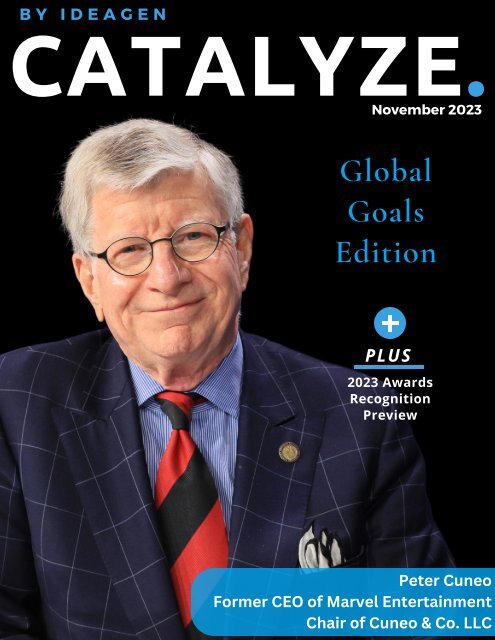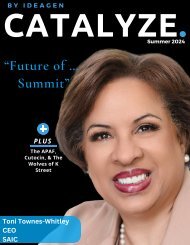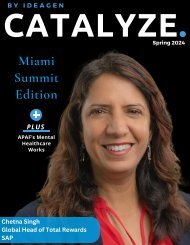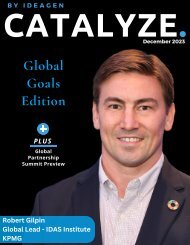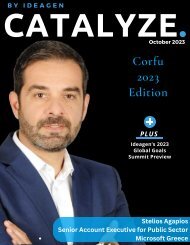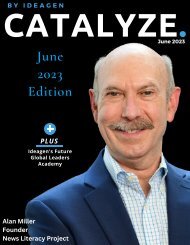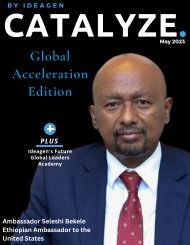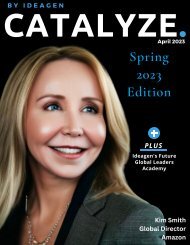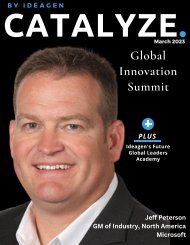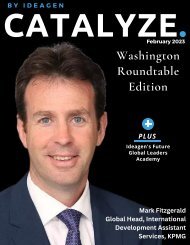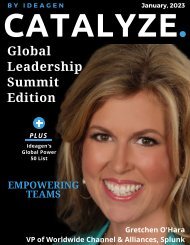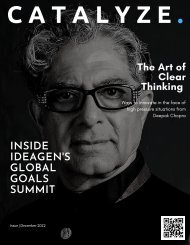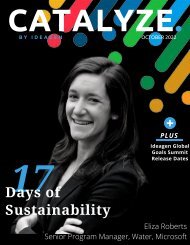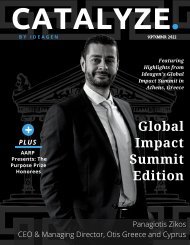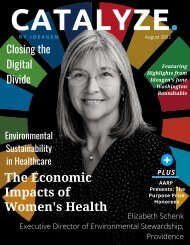Ideagen Global - Catalyze Magazine - November 2023
With Ideagen's extensive member network and influential platform, Catalyze Magazine serves as an aggregate for all the content, events, articles, and collaboration that we do. It is a monthly magazine where you will find transcriptions from Ideagen events, content, articles, and information surrounding how we are completing our mission. With this magazine, we want to highlight the nature of cross-sector collaboration and how we infuse it into our daily mission on a global scale. Ideagen's monthly Catalyze Magazine is back with our November edition. Inside, view conversations from the 2023 Global Goals Summit, hosted at the Nasdaq Global Headquarters in New York City! This months covers features speakers: Peter Cuneo, Scott Frisch, Sami Hassanyeh, Lana Wong, Gretchen O'Hara, Betsy Reed, Sarah Walters, Marcus Henderson, Nick Ballard, Alexandra Mitsotakis, Mani Dasgupta, and Rawle Andrews Jr!
With Ideagen's extensive member network and influential platform, Catalyze Magazine serves as an aggregate for all the content, events, articles, and collaboration that we do. It is a monthly magazine where you will find transcriptions from Ideagen events, content, articles, and information surrounding how we are completing our mission. With this magazine, we want to highlight the nature of cross-sector collaboration and how we infuse it into our daily mission on a global scale.
Ideagen's monthly Catalyze Magazine is back with our November edition. Inside, view conversations from the 2023 Global Goals Summit, hosted at the Nasdaq Global Headquarters in New York City!
This months covers features speakers: Peter Cuneo, Scott Frisch, Sami Hassanyeh, Lana Wong, Gretchen O'Hara, Betsy Reed, Sarah Walters, Marcus Henderson, Nick Ballard, Alexandra Mitsotakis, Mani Dasgupta, and Rawle Andrews Jr!
You also want an ePaper? Increase the reach of your titles
YUMPU automatically turns print PDFs into web optimized ePapers that Google loves.
B Y I D E A G E N<br />
CATALYZE.<br />
<strong>November</strong> <strong>2023</strong><br />
<strong>Global</strong><br />
Goals<br />
Edition<br />
PLUS<br />
<strong>2023</strong> Awards<br />
Recognition<br />
Preview<br />
Peter Cuneo<br />
Former CEO of Marvel Entertainment<br />
Chair of Cuneo & Co. LLC
B Y I D E A G E N<br />
CATALYZE.<br />
<strong>November</strong> <strong>2023</strong><br />
<strong>Global</strong><br />
Goals<br />
Edition<br />
PLUS<br />
<strong>2023</strong> Awards<br />
Recognition<br />
Preview<br />
Scott Frisch<br />
Executive VP & COO<br />
AARP
B Y I D E A G E N<br />
CATALYZE.<br />
<strong>November</strong> <strong>2023</strong><br />
<strong>Global</strong><br />
Goals<br />
Edition<br />
PLUS<br />
<strong>2023</strong> Awards<br />
Recognition<br />
Preview<br />
Sami Hassanyeh<br />
SVP of Digital Strategy<br />
AARP
B Y I D E A G E N<br />
CATALYZE.<br />
<strong>November</strong> <strong>2023</strong><br />
<strong>Global</strong><br />
Goals<br />
Edition<br />
PLUS<br />
<strong>2023</strong> Awards<br />
Recognition<br />
Preview<br />
Lana Wong<br />
Founder<br />
Moderate The Panel
B Y I D E A G E N<br />
CATALYZE.<br />
<strong>November</strong> <strong>2023</strong><br />
<strong>Global</strong><br />
Goals<br />
Edition<br />
PLUS<br />
<strong>2023</strong> Awards<br />
Recognition<br />
Preview<br />
Gretchen O’Hara<br />
Channel Chief, VP of Worldwide Channels & Alliances<br />
Splunk
B Y I D E A G E N<br />
CATALYZE.<br />
<strong>November</strong> <strong>2023</strong><br />
<strong>Global</strong><br />
Goals<br />
Edition<br />
PLUS<br />
<strong>2023</strong> Awards<br />
Recognition<br />
Preview<br />
Betsy Reed<br />
Co Founder & CRO<br />
Cloudwerx
B Y I D E A G E N<br />
CATALYZE.<br />
<strong>November</strong> <strong>2023</strong><br />
<strong>Global</strong><br />
Goals<br />
Edition<br />
PLUS<br />
<strong>2023</strong> Awards<br />
Recognition<br />
Preview<br />
Sarah Walters<br />
Executive Director<br />
HOSA-Future Health Professionals
B Y I D E A G E N<br />
CATALYZE.<br />
<strong>November</strong> <strong>2023</strong><br />
<strong>Global</strong><br />
Goals<br />
Edition<br />
PLUS<br />
<strong>2023</strong> Awards<br />
Recognition<br />
Preview<br />
Marcus Henderson<br />
Board Chair<br />
HOSA-Future Health Professionals
B Y I D E A G E N<br />
CATALYZE.<br />
<strong>November</strong> <strong>2023</strong><br />
<strong>Global</strong><br />
Goals<br />
Edition<br />
PLUS<br />
<strong>2023</strong> Awards<br />
Recognition<br />
Preview<br />
Nick Ballard<br />
President-Elect<br />
HOSA-Future Health Professionals
B Y I D E A G E N<br />
CATALYZE.<br />
<strong>November</strong> <strong>2023</strong><br />
<strong>Global</strong><br />
Goals<br />
Edition<br />
PLUS<br />
<strong>2023</strong> Awards<br />
Recognition<br />
Preview<br />
Alexandra Mitsotakis<br />
Co-Founder & President<br />
The World Human Forum
B Y I D E A G E N<br />
CATALYZE.<br />
<strong>November</strong> <strong>2023</strong><br />
<strong>Global</strong><br />
Goals<br />
Edition<br />
PLUS<br />
<strong>2023</strong> Awards<br />
Recognition<br />
Preview<br />
Mani Dasgupta<br />
VP, <strong>Global</strong> Advisory Partnerships<br />
IBM
B Y I D E A G E N<br />
CATALYZE.<br />
<strong>November</strong> <strong>2023</strong><br />
<strong>Global</strong><br />
Goals<br />
Edition<br />
PLUS<br />
<strong>2023</strong> Awards<br />
Recognition<br />
Preview<br />
Rawle Andrews Jr.<br />
Executive Director<br />
American Psychiatric Association Foundation
TABLE OF<br />
CONTENTS<br />
01<br />
Peter Cuneo<br />
Former CEO of Marvel Entertainment, Chair of Cuneo & Co. LLC<br />
02 AARP<br />
Scott Frisch, COO, Sami Hassanyeh, SVP of Digital Strategy, and<br />
Moderator Lana Wong<br />
03<br />
04<br />
05<br />
06<br />
07<br />
08<br />
Gretchen O’Hara<br />
VP of Worldwide Channels & Alliances, Splunk<br />
Betsy Reed<br />
Co-Founder & CRO, Cloudwerx<br />
HOSA-Future Health Professionals<br />
Executive Director Sarah Walters, Board Chair Marcus<br />
Henderson, & President-Elect Nick Ballard<br />
Alexandra Mitsotakis<br />
Co-Founder & President, World Human Forum<br />
Mani Dasgupta<br />
VP, <strong>Global</strong> Advisory Partnerships, IBM<br />
Rawle Andrews jr.<br />
Executive Director, American Psychiatric Association Foundation
G L O B A L<br />
Developing Superhero<br />
Leadership Today<br />
With Peter Cuneo<br />
Former CEO of Marvel<br />
Entertainment & Chair of Cuneo &<br />
Co LLC.<br />
Peter Cuneo at The <strong>Global</strong> Goals Summit<br />
Robert Reiss: What is your view of leadership today, and how does it relate to your<br />
experience in leadership?<br />
Peter Cuneo: Today, I'm here to talk about leadership and to talk about what I think is<br />
a tremendous lack of leadership, of quality leadership, of superhero leadership in the<br />
world today. When I start my talks, I like to say that we may have less good leadership<br />
in the world than ever in human history. I know that it's a very big comment and<br />
probably not exactly accurate, but all you have to do is turn on a television to prove my<br />
point.<br />
We are hurting, and if we are going to achieve these 17 objectives for sustainable<br />
development, we are going to need a lot more good leadership in the world, but it has<br />
to be led by younger people; there's no question about it. I work with a lot of young<br />
people today, as I'm still very active in 5 or 6 businesses, and I see the lacking, if you<br />
will, that young people have.<br />
I'm going to talk about that a little bit, and what I think we can do about it, or certainly<br />
what you all can do about it, whether you're someone who aspires to leadership today,<br />
sitting in the audience, whether you're a parent or a grandparent that would like to help<br />
your kids grow in terms of good leaders because if you can become an effective leader,<br />
you will crush it. You have no competition. You're going to have a very happy life, but<br />
leadership is synonymous with courage.<br />
CATALYZE MAGAZINE | 1
D E V E L O P I N G S U P E R H E R O L E A D E R S H I P<br />
T O D A Y , W I T H P E T E R C U N E O<br />
Peter: My first question for everybody is simply, "Are leaders born or made?" The<br />
second question is, "Where does leadership instinct come from?" I think leaders are<br />
never born. Yes, you may be born with some intelligence and what have you, but we all<br />
learn leadership through our life experiences, whether they be personal, professional, or<br />
whatever form it takes. I started really learning about leadership in the Vietnam War as a<br />
Navy officer on a guided missile destroyer and a communications officer and damage<br />
control officer. I was in the combat zone in North Vietnam; I did two tours.<br />
I don't recommend anyone to learn leadership this way, but it was the way it was for me.<br />
I believe very strongly that leadership instinct comes largely only one way, and that's in<br />
face-to-face human interactions. The more diverse those face-to-faces are, the better.<br />
Diversity in terms of people, diversity in terms of personal and professional life,<br />
geography, it's all important. Learn about cultures elsewhere in the world, and as those<br />
experiences grow, you learn instincts, and instinct leads to behaviors. These are what<br />
lead to effective leadership.<br />
Peter Cuneo and Robert Reiss<br />
Peter Cuneo, Robert Reiss, Sidhant Gupta, George Sifakis, & George Sifakis Jr.<br />
CATALYZE MAGAZINE | 2
The Future of AI within<br />
AARP<br />
Moderated by Lana Wong, Featuring AARP COO Scott Frisch, & SVP of<br />
Digital Strategy, Sami Hassanyeh<br />
Lana Wong: What is your vision for the<br />
next five years?<br />
Sami Hassanyeh: We'd like to bring every<br />
piece of value we have in our organization<br />
to every single member or prospective<br />
member in a way that is so relevant to them<br />
that we become indispensable. Not in terms<br />
of them wanting to belong to AARP but<br />
because they think AARP enhances the<br />
way they live their lives, that we bring value<br />
and solutions to them that make their lives<br />
better. I think that's really critical for us.<br />
Sami: Rather than thinking of customer<br />
lifetime value as what the consumer brings<br />
to the company, rather what we give the<br />
consumer in such a way that they want to<br />
maintain a relationship with us over time. I<br />
think platforms like AI allow us to slice the<br />
AARP value proposition for you and then<br />
enhance that over time as your relationship<br />
with us grows and as we better understand<br />
your wants and needs as you go through<br />
life transitions.<br />
Our ability to intuitively understand and<br />
deliver value to you in context, leveraging<br />
machine learning and AI, is where we<br />
think we need to be and to deliver that in<br />
a much more intuitive consumer user<br />
interface. Our user interfaces are very<br />
good on mobile and the web, but I think<br />
natural language has a way to go. I think<br />
in the future, we'll be dealing with our<br />
own personal AI, as well as the consumer,<br />
so we have to be ready. I think those are<br />
going to be some of the challenges we face<br />
as we go forward.<br />
Sami Hassanyeh of AARP<br />
CATALYZE MAGAZINE | 3
The Future of AI Within AARP<br />
Lana Wong: Speaking of those challenges, I'm sure we've all read the doomsday predictions<br />
of AI as well as the utopian AI dream scenarios. So, how are you all trying to really balance<br />
that operational governance risk with this enormous potential that AI provides?<br />
Scott Frisch: First of all, It's a great question because there is no single answer for<br />
everybody. Every company has its own level of risk tolerance or appetite, but at AARP, we<br />
think about doing this in stages. Let's understand what AI can and can't do today because<br />
that's going to change tomorrow. We've essentially come and established a working group<br />
to create a set of governance rules and training for our organization. We're evolving as<br />
things change, but the centerpiece of our governance is to ensure there's a human-in-theloop.<br />
That is a key component.<br />
Look at ChatGPT, for example, which came out in September of 2021. Just for fun, we<br />
were planning a trip to Chicago, and we asked it to provide an itinerary for three days in the<br />
city of Chicago in the middle of July. It came up with this great itinerary for three days, but<br />
three of the restaurants recommended we're no longer in business. So, that human-in-theloop<br />
piece is extremely important.<br />
CATALYZE MAGAZINE | 4
Scott: I realize that what I'm about to say is far from the capability of what AI has, but I do<br />
remember when Excel came out, and I am an accountant by trade. The partners at the firm where I<br />
worked didn't know how to use a computer, didn't know Excel, and didn't understand Excel. They<br />
would say go ahead and use Excel, but the output is only as good as what you put into the Excel<br />
formula. If you missed a piece of the formula, your entire input will be wrong, so you still need to<br />
check it. Now, granted, that's a really tactical, outdated reference, but it's the same thing with AI if<br />
you think about it using my example for an itinerary to Chicago.<br />
The human-in-the-loop is really the basis of our governance and our risk model. We still need to<br />
understand how we're going to use it and what its capabilities are, and as that understanding grows,<br />
our risk and governance model will change.<br />
Scott Frisch & Sami Hassanyeh<br />
Lana Wong, Sami Hassanyeh, and Scott Frisch<br />
AARP COO Scott Frisch<br />
CATALYZE MAGAZINE | 5
A S S E S S I N G A N D<br />
S O L V I N G F O R T H E D A T A<br />
D I V I D E<br />
W I T H G R E T C H E N O ’ H A R A ,<br />
C H A N N E L C H I E F A N D V P O F<br />
W O R L D W I D E C H A N N E L S &<br />
A L L I A N C E S A T S P L U N K<br />
George Sifakis: I know there's another area<br />
that is so important to you personally and<br />
professionally, and that's the data divide. I<br />
know this is something I'm personally<br />
interested in, as well as <strong>Ideagen</strong>, but what is<br />
the data divide, and how can we tackle it?<br />
Gretchen O'Hara: It's a relatively new<br />
concept. I think we're all very used to the<br />
digital divide, and we've talked about that<br />
for quite some time, but the digital divide<br />
is essentially about access. How do you<br />
make sure you have access to be more<br />
productive and essentially rebalance the<br />
scales of inequity? But what's happening<br />
now, and I think we are just waking up to<br />
this, is that data is king. Data is a sort of<br />
new access, and we've seen that through<br />
the explosion in the consumer world with<br />
ChatGPT as an example. I was talking<br />
about this last night at a dinner, and for<br />
example, I had led the AI business at<br />
Microsoft before I went to Splunk. Then, I<br />
was fighting to make sure that both the<br />
commercial and public sectors understood<br />
the value of AI, but I would say we were<br />
very nascent in that work.<br />
Gretchen O’Hara, Spunk<br />
Gretchen: Now, all of a sudden, it's table<br />
topics with everyone from your<br />
grandparents to your child, and to your<br />
point, that's how fast things have<br />
changed. In the last ten years, we've ten<br />
folded the zettabytes of data; those are<br />
massive data sets that we've never seen<br />
before in our lifetime. As we think about<br />
the technology revolution continuing, we<br />
went essentially from the industrial<br />
revolution to the technology revolution,<br />
and that being core to access, now it's<br />
about data. We will actually see the<br />
continuation of that data growth over the<br />
next couple of years, all the way through<br />
2025. We'll see it double again. So what<br />
do we do? What does that mean to<br />
anybody when we think about how data<br />
is so important and that data is king to all<br />
of us?<br />
CATALYZE MAGAZINE | 6
A S S E S S I N G A N D S O L V I N G F O R T H E D A T A<br />
D I V I D E<br />
Gretchen: Its benefits, of course, are that we get access to incredible information that<br />
makes us smarter and more productive. It makes us safer and more resilient as citizens<br />
and companies across the globe. Still, it also starts to create an inequity with countries<br />
that don't have access to data, are in geopolitical climates where they won't give access<br />
to data, or poor or underserved communities where they can't afford to leverage that<br />
kind of data.<br />
What's happening is the commercial side of the business has the money and the means<br />
to leverage data in a very smart way, but when we think about the public sector, NGOs,<br />
and nonprofits, or we think about citizens in different communities or different<br />
countries across the globe, there's none. We're actually creating a larger set of inequities<br />
between people. They don't have the same access or the same ability to use those<br />
insights, and it becomes a marginalization between them.<br />
CATALYZE MAGAZINE | 7
A S S E S S I N G A N D S O L V I N G F O R T H E D A T A<br />
D I V I D E<br />
Gretchen: For the data divide, first, we have to wake up and realize that data is driving the<br />
way we think and make decisions. We're seeing this every day with AI. We also know that<br />
we're pulling people further apart because it's the haves and the have-nots. I'll give you a<br />
real-world example: When we were in the pandemic, think about the data that was used to<br />
help. Quite frankly, people understood where the infection rate was and how safe you were<br />
in your community. Think about the notifications received on exposures. When COVID<br />
landed in Seattle, The University of Washington Medical was one of the first data science<br />
groups to take advantage of data and then share that out into the world. MayoClinic and<br />
others caught on, but if you were lucky enough to have those resources, you essentially had<br />
some protection as a citizen. That's the good side, but there's a bad side.<br />
When UCSF was partnering on that same kind of data, public health officials were trying<br />
to get information out into San Francisco. However, the data sets were so big and too<br />
complex, and the company that was assessing the data was using fax machines. This is a<br />
true story. So even though you had this massive amount of data, the public entities didn't<br />
have the infrastructure, the ability, the means, or the digital literacy to capture that. So<br />
what did they do? They bought more fax machines if you can believe that. I don't even<br />
know if I could use a fax machine anymore, but they used more and more fax machines. So<br />
the idea behind that is now you have somebody without those resources. That is the kind of<br />
example to bring it into sort of human terms of what this access actually means.<br />
George Sifakis & Gretchen O’Hara outside<br />
The Nasdaq Marketside<br />
George Sifakis interviews Gretchen O’Hara<br />
CATALYZE MAGAZINE | 8
<strong>Ideagen</strong>’s <strong>2023</strong> <strong>Global</strong><br />
Ladership &<br />
ImpactAwards<br />
Coming soon, <strong>Ideagen</strong>’s Recognition<br />
Awards highlighting individuals and<br />
organizations for <strong>Global</strong> Leadership &<br />
Impact in <strong>2023</strong>!<br />
CATALYZE MAGAZINE | 9
F I N D I N G P O W E R<br />
I N D I S C O M F O R T<br />
WITH BETSY REED: CO-FOUNDER<br />
& CRO AT CLOUDWERX<br />
Betsy at The <strong>Global</strong> Goals Summit<br />
Betsy Reed: So relax, and join me as we<br />
get a little uncomfortable. The human<br />
body is a complex machine; as a<br />
testament to many of the speeches heard<br />
here today, I feel like I've learned so<br />
much already. It's made up of hundreds<br />
and hundreds of systems that are<br />
designed to keep us safe. One of those<br />
systems is responsible for the feeling of<br />
discomfort in our bodies, and it comes in<br />
three biological forms: physical, mental,<br />
and emotional.<br />
Of the three, physical pain is probably<br />
the most relatable, as we all have pain<br />
receptors in our body that alert us when<br />
we're in danger of physical harm. When<br />
you put your hand near a hot stove, the<br />
heat receptors notice the heat and alert<br />
you to pull it away. If they didn't exist at<br />
all, we wouldn't know to take our hand<br />
from the stove until it was red and<br />
blistered. The damage is already done.<br />
This is an important system in our body.<br />
Betsy: The second is mental discomfort.<br />
While there's a wide magnitude of<br />
severity that comes from this discomfort,<br />
I'm going to focus on two that are the<br />
most common that we probably<br />
experience on a weekly, if not daily,<br />
basis, and that's cognitive dissonance and<br />
mental fatigue.<br />
Cognitive dissonance is when our<br />
thoughts and beliefs do not align with our<br />
actions. We have evolved to feel the<br />
situation as painful. Why? It prompts us<br />
to course correct and to gain internal<br />
alignment. Think about the last time you<br />
committed to either starting or stopping a<br />
behavior, a hobby, or something like that.<br />
What happened when you went back on<br />
that commitment? It probably didn't feel<br />
good. We've evolved to notice this as a<br />
perception so that we can be triggered to<br />
make clear decisions and stick with them<br />
in the future. It's very important.<br />
CATALYZE MAGAZINE | 10
F I N D I N G P O W E R I N D I S C O M F O R T<br />
In addition, there's also mental fatigue. This is in place, so we shift tasks. Our mind can<br />
only focus on one task or activity for a certain amount of time. We need that breathing<br />
room so we can be productive, creative, and motivated. We can think outside of the<br />
box. This is critical. In the same vein, in this world of instant gratification and digital<br />
dopamine hits, we're constantly distracted, so you need to focus when you are on that<br />
task and give it your full attention. It's your superpower.<br />
The third form is emotional discomfort. Think about your most recent positive<br />
experience. What feelings came up during or after? Happiness? Love? Excitement?<br />
Enjoyment? How about negative? What arose in your body? Shame? Sadness? Pain?<br />
Emotions are what galvanize experiences in our subconscious and conscious minds.<br />
They allow us to draw from those associations and hopefully recreate the good<br />
experiences in the future and then prevent or avoid the negative ones. That's why<br />
they're there. With all of these different systems working, the danger comes when we<br />
lose touch with reality. So when is discomfort and the feeling of it a true threat and<br />
something we should pay attention to, and when is it an opportunity to build strength<br />
and resiliency? The opportunity lies here to learn to harness this power and use it for<br />
good, safely, with maximum development and minimum damage.<br />
CATALYZE MAGAZINE | 11
THE MISSION OF<br />
HOSA-FUTURE HEALTH<br />
PROFESSIONALS<br />
With Executive Director, Sarah Walters, Board Chair Marcus<br />
Henderson, & President-Elect Nick Ballard<br />
Sarah Walters: I think we really need to dig into what HOSA-Future Health Professionals is.<br />
Nick, I'll ask you that question to describe what we do and what our goals are.<br />
Nick Ballard: HOSA-Future Health Professionals is a career and technical student organization,<br />
and we're fortunate to be recognized by the US Department of Education for our partnership with<br />
health science educators. We're also international, which means that we're in multiple countries,<br />
serving as a bridge for developing tomorrow's health professionals by empowering them to<br />
realize their abilities, diverse talents, and skill sets today.<br />
We do this through a range of different programs. We have competitive events and conferences,<br />
but aside from beyond the classroom, we also have programs within the classroom. We're heavily<br />
integrated within health science education, and I think the ability for us to be within the<br />
classroom and extend beyond the classroom, providing excitement about the health care industry<br />
for students all across the world, is what serves to our benefit collectively, to be the pipeline of<br />
future health professionals.<br />
Nick Ballard speaks at The <strong>Global</strong> Goals Summit<br />
Sarah Walters & Nick Ballard<br />
CATALYZE MAGAZINE | 12
THE MISSION OF HOSA<br />
Sarah: That's really building off Sustainable Development Goal Four of Quality Education, and<br />
particularly bringing equitable access to career and technical education experiences. That's one<br />
of the things that I love. We talked about all being members of the organization but having<br />
various backgrounds. I grew up in a very rural community with only about 1100 people in the<br />
town. But Marcus, you were in inner Philadelphia, two very different areas of the world, yet we<br />
had very similar experiences within the organization. Could you tell us about what your<br />
experience in HOSA was like and how that shaped your future professional journey?<br />
Marcus Henderson: Thank you so much, Sarah. I think one thing that's key for all of us to<br />
understand in this room and online is that HOSA is a student-led organization. I'm a registered<br />
nurse by education and training, specifically in child and adolescent psychiatry. I would not be<br />
the person, nurse, or leader I am today had it not been for my involvement in HOSA-Future<br />
Health Professionals. You know, Nick was talking about how HOSA is integrated within the<br />
classroom. We take students who are in health science education programs and who have<br />
interests in health careers in the United States and globally, and we bring them in to enhance that<br />
classroom learning. We rely on teachers and health science educators to give us competencybased<br />
education, skills-based learning, and work-based learning experiences. For me, that was in<br />
a health-related technology program that was producing most of us to go into careers in nursing.<br />
CATALYZE MAGAZINE | 13
THE MISSION OF HOSA<br />
Marcus: We had a particular focus on nurses assisting in the program that I participated in<br />
during high school. For me, it was attending our state leadership conferences and international<br />
leadership conferences that boast over 10,000 young people interested in taking care of a global<br />
society. For me to be sitting here public speaking, those soft skills, which we talked a lot about<br />
today, are crucial. It's not just the knowledge you possess and the competencies you hold but also<br />
your ability to establish relationships, connect, collaborate, and work in multidisciplinary or<br />
interdisciplinary teams.<br />
That's what HOSA-Future Health Professionals is. It's enhancing classroom learning to put<br />
students in opportunities in spaces and places that give them the ability to see diverse people,<br />
diverse experiences, and diverse thoughts. That's what I think you're talking about that brings us<br />
all together. We grow up in very different places across the globe but come together for a<br />
common goal of being global leaders in a global society.<br />
HOSA receives the <strong>2023</strong> <strong>Global</strong> Impact Award<br />
Marcus Henderson at The <strong>Global</strong> Goals Summit<br />
HOSA Future Health Professionals Panel<br />
CATALYZE MAGAZINE | 14
IDEAGEN’S <strong>2023</strong> GLOBAL<br />
GOALS SUMMIT<br />
16<br />
17<br />
1<br />
2<br />
15<br />
3<br />
14<br />
4<br />
13<br />
12<br />
6<br />
5<br />
11<br />
7<br />
10<br />
9<br />
8<br />
FROM THE NASDAQ GLOBAL HEADQUARTERS, NYC<br />
STREAMING ON IDEAGEN TV, DECEMBER 1ST, <strong>2023</strong><br />
CATALYZE MAGAZINE | 15
T H E W O R L D H U M A N<br />
F O R U M & T H E<br />
I M P O R T A N C E O F D E L P H I<br />
W I T H A L E X A N D R A<br />
M I T S O T A K I S , C O - F O U N D E R &<br />
P R E S I D E N T O F T H E W O R L D<br />
H U M A N F O R U M<br />
George Sifakis: I'd love for you to<br />
describe to our global audience what the<br />
World Human Forum does and, most<br />
importantly, what inspired you to cofound<br />
this incredible organization.<br />
Alexandra Mitsotaki: The truth is that<br />
I've been working for so many years in<br />
the global south fighting poverty and<br />
inequalities. I met incredible people,<br />
men, women, and children sometimes,<br />
who were pushed out of the need to<br />
change their lives and that of their<br />
communities. They managed to do so by<br />
being in the driving seat themselves,<br />
becoming agents of change, and finding<br />
solutions to their problems.<br />
I felt if the most excluded and poorest of<br />
people can do that, surely we should<br />
look around our own societies to see<br />
what's going on there. This is what I did<br />
in France, where I lived, in Greece,<br />
where I also lived, and all over the<br />
world.<br />
Alexandra Mitsotakis<br />
Alexandra: It was not surprising to me<br />
to find so many initiatives, from the<br />
bottom up, citizen initiatives where<br />
people were changing the world day by<br />
day, step by step.<br />
George: Changing the world day by<br />
day, step by step. I love that, and<br />
therein lies the inspiration. You've<br />
been inspired, as you said, by so many<br />
people across the planet. You're<br />
dedicated to changing the world by cofounding<br />
this incredible organization,<br />
and I'd like to take it a step further.<br />
Why is the town of Delphi so crucial<br />
for your work at the World Human<br />
Forum?<br />
CATALYZE MAGAZINE |16
T H E W O R L D H U M A N F O R U M & T H E<br />
I M P O R T A N C E O F D E L P H I<br />
Alexandra: I'm Greek, and when I started thinking seriously about founding the World<br />
Human Forum, which I felt was needed in my capacity as a global citizen, It didn't have<br />
to be Greece, but then, when you are Greek, why not Greece? When I started thinking<br />
of Greece, then Delphi became the obvious first choice.<br />
For those of you who don't know, Delphi used to be the center of the ancient world. It<br />
was the novel. It was the Omphalos, as we say in Greek, and it was a place where<br />
people were going to ask questions. They didn't have the answers. They were looking<br />
for the questions, but they were also looking for something else. They were looking for<br />
dialogue. They were looking for exchange, for respect from each other and for each<br />
other's different positions and beliefs. There was no war. It was a perfect union. The<br />
world was stopping at the borders of Delphi, and this made it the right place for us to<br />
found the World Human Forum.<br />
CATALYZE MAGAZINE | 17
DEVELOPING CROSS-SECTOR<br />
PARTNERSHIPS AT IBM<br />
WITH MANI DASGUPTA, VP OF GLOBAL ADVISORY<br />
PARTNERSHIPS AT IBM<br />
Mani Dasgupta: How can the private sector to which I<br />
belong really help in achieving the UN SDGs? Yes,<br />
they can bring funding. Yes, they employ many people<br />
and contribute to the GDP. They can commit to the<br />
Sustainable Development Goals through Tracking,<br />
reporting, and making sure they inspire people, but<br />
what they can also do is share the innovations. Share<br />
the development that's happening within these private<br />
institutions. I'll share one example, and this inspires me<br />
to no end.<br />
Mani Dasgupta at The <strong>Global</strong> Goals Summit<br />
Mani Dasgupta: IBM<br />
At IBM Research, we have our own research arm, as some of you know, and we invest<br />
heavily in what's next. What's next in the next five years, ten years, 15 years? They came<br />
up with Watson, which is our AI model and quantum computing. Recently, they<br />
developed something called VolCat, a new innovative model of recycling. VolCat stands<br />
for Volatile Catalyst. We have developed in our research facilities a way to make sure that<br />
plastic recycling becomes not only easy but non-reliant on fossil fuels.<br />
Mani Dasgupta presents at The <strong>Global</strong> Goals Summit<br />
George Sifakis & Mani Dasgupta<br />
CATALYZE MAGAZINE | 18
DEVELOPING CROSS-SECTOR<br />
PARNTERSHIPS AT IBM<br />
Mani: How does that happen? Today, when recycling, we separate things into different<br />
buckets. We take labels off, we wash them, and they go through separate processing,<br />
paper, and plastics. Even with plastics, there are different kinds, and some cannot be<br />
recycled. However, there is cross-contamination. When this happens, a lot of materials<br />
actually go into landfills. Almost 70% is not used today. IBM's technology has<br />
developed something in which you don't have to segregate; everything can come<br />
together.<br />
One of the significant causes of pollution worldwide is fast fashion, but clothes,<br />
carpets, all of that you can put together. You don't even need to wash them. It all goes<br />
in together. That VolCat system actually looks at processing the P.E.T. out of that and<br />
creates 100% recyclable. Now, if you put this system into the facilities manufacturing<br />
plastics, it can take the old plastic and create new ones. In the future, you won't need<br />
to rely on fossil fuels and petroleum to be able to create plastics. That's an innovation<br />
to bring that mainstream, but we will need the administration, we will need the people<br />
to do things differently, and it will require all of us to work together in different ways.<br />
CATALYZE MAGAZINE | 19
<strong>2023</strong> <strong>Ideagen</strong> <strong>Global</strong><br />
LOCAL CHANGE FOR<br />
GLOBAL IMPACT<br />
SUMMIT<br />
From Corfu, Greece<br />
Now Streaming on<br />
<strong>Ideagen</strong><strong>Global</strong>.com<br />
CATALYZE MAGAZINE | 20
AN IDEAGEN GLOBAL EXCLUSIVE<br />
Ending the Stigma on Mental<br />
Health & Depression<br />
With Executive Director of The American Psychiatric Association Foundation,<br />
Rawle Andrews Jr.<br />
Rawle: That is why we haven't been able to<br />
demonstrate the fire, passion, energy, and the<br />
seriousness of purpose that is required. We let<br />
a word that we don't understand, that we don't<br />
know where it comes from, do something for a<br />
health condition that no other health condition<br />
is fighting in the current day. One of the<br />
examples we like to use is diabetes as it relates<br />
to depression.<br />
Rawle Andrews Jr at The <strong>Global</strong> Goals Summit<br />
Rawle Andrews: As I have looked at social<br />
determinants of health, working with our team,<br />
I've found that there is stress coursing through<br />
the veins of every one of the 17 development<br />
goals. We all know and should know that there is<br />
positive stress and there is negative stress. The<br />
question is, how do we navigate this spectrum of<br />
stress at any stage and any age?<br />
Unlike many of the other goals, where<br />
sometimes certain zip codes are further<br />
marginalized than others, mental illness doesn't<br />
discriminate against anybody at any age or any<br />
stage; at any place, any time, or anywhere, you<br />
can be touched, your teammates can be touched,<br />
and your loved ones can be touched. But what<br />
we often do is get stuck on stigma.<br />
There was a time when people didn't know<br />
what A1C was; now, whether you know what<br />
your A1C score is or not, you don't hear<br />
anybody talking about diabetes and stigma.<br />
You don't hear about anybody being afraid to<br />
tell somebody at work, play, or worship, "I<br />
have diabetes, I'm type two, I'm type one,"<br />
whatever the case may be. That's because<br />
we've prioritized it.<br />
We've recognized that diabetes is treatable, and<br />
you can still live a normal life. You have a<br />
treatable health condition; get some help if help<br />
is available, and let's move forward. The same<br />
is true of depression. Depression is a treatable<br />
condition, so we can't be stuck on stigma when<br />
somebody is trying to tell us or we're trying to<br />
tell somebody else that we need some help. All<br />
of us, at some point, are going to be touched.<br />
CATALYZE MAGAZINE | 21
ENDING THE STIGMA ON MENTAL HEALTH &<br />
DEPRESSION<br />
Rawle: I think if the pandemic taught us anything, it taught that none of us going into the pandemic are<br />
the same way coming out. We're not whole and well. When you travel the world, since we're at a global<br />
summit, if you are in the Maasai villages of Africa, the first thing they say is not good morning, good<br />
afternoon, or good evening. what the Maasai say is, "How are the children?" And the common response,<br />
if true, is "The children are well." The message from that is that if the children are well, then the village<br />
is doing well, and we're doing the right things the way we're supposed to be.<br />
Well, here's the news flash at the <strong>Global</strong> Gold Summit: The children are not all right, and neither are<br />
we. That's why we must summon the courage to demonstrate seriousness of purpose, because it's going<br />
to take us working in our lanes, playing our positions expertly. Whatever your lane is, when we hit the<br />
field, we don't need you to try to play all the positions. We just need to know that you're going to play<br />
your position, and you need to be able to trust that I'm going to play my position. In the <strong>Ideagen</strong><br />
conclave, we have to be everyday players. There's no time for utility with only seven years. We have to<br />
play every day, and we have to make sure our teams are ready to play every day. And when they're not<br />
ready, we have to summon the courage to say if you need a day, take a day.<br />
CATALYZE MAGAZINE | 22
Editor's Note<br />
Dear Friends and Colleagues, as we near the conclusion of<br />
<strong>2023</strong>, there are many trends and advancements to be optimistic about.<br />
From breakthroughs in technology to inspiring advancements in<br />
sustainability, it's an exciting time. The world continues to evolve, with<br />
AI and virtual experiences becoming increasingly accessible and diverse,<br />
including the latest from ChatGPT and OpenAI.<br />
Following a successful <strong>Global</strong> Partnerships Summit and <strong>Global</strong> Goals<br />
Summit at the Nasdaq in October and streaming on December 1st, we are<br />
extremely grateful to all those who support the <strong>Ideagen</strong> Mission. Looking<br />
ahead, we are excited to begin 2024 with the 1st Annual <strong>Ideagen</strong> <strong>Global</strong><br />
AI, Health, Tech & Finance Summit in Coral Gables, Florida, on 1.31.24!<br />
<strong>Catalyze</strong> <strong>Magazine</strong>, by <strong>Ideagen</strong> <strong>Global</strong>, is also impacting the awareness<br />
of the <strong>Global</strong> Goals and connecting the dots across sectors as we<br />
highlight all the exciting developments with our readers for <strong>2023</strong> and into<br />
2024!<br />
The Best is Indeed Yet To Be!<br />
GEORGE SIFAKIS<br />
GEORGE SIFAKIS<br />
Editor-in-Chief & CEO<br />
-<strong>Ideagen</strong><br />
CATALYZE MAGAZINE | 23<br />
DANIEL KERNS<br />
Senior Editor<br />
ALEXA SIFAKIS<br />
Publication Co-Editor<br />
Pictured Top to Bottom<br />
Phyllis Ferrell, DAC<br />
The Daughters of Penelope<br />
Jeff Terry, GAF


